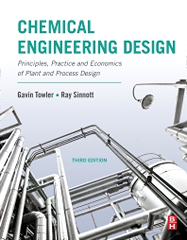Chemical Engineering Design Principles Practice and Economics of Plant and Process Design
Material type: TextLanguage: English Publication details: Kidlington,Oxford : Butterworth-Heinemann, ©2022Edition: 3rdDescription: XII, 1027 p. : illISBN:
TextLanguage: English Publication details: Kidlington,Oxford : Butterworth-Heinemann, ©2022Edition: 3rdDescription: XII, 1027 p. : illISBN: - 9780128211793
- 660 TOW
| Item type | Current library | Shelving location | Call number | Copy number | Status | Date due | Barcode |
|---|---|---|---|---|---|---|---|
 Reference Collection
Reference Collection
|
Seminar Library | Department of Food Engineering | 660 TOW | 2022-23 | Available | 98066 |
About the Authors
Gavin Towler
Gavin Towler Ph.D. is the Vice President and Chief Technology Officer of UOP LLC, a Honeywell company. UOP is a leading supplier of catalysts, process technology, proprietary equipment and services to the oil, gas and petrochemical industries. In this capacity he is responsible for delivering process, catalyst and equipment innovations for UOP’s four businesses.
Gavin has 20 years of broad experience of process and product design and has 65 US patents. He is co-author of “Chemical Engineering Design”, a textbook on process design, and is an Adjunct Professor at Northwestern University, where he teaches the senior design classes.
Gavin has a B.A. and M.Eng. in chemical engineering from Cambridge University and a Ph.D. from U.C. Berkeley. He is a Chartered Engineer and Fellow of the Institute of Chemical Engineers, and is a Fellow of the AIChE.
Affiliations and Expertise
Vice President and Chief Technology Officer, Honeywell/UOP, Des Plaines, IL, USA
Ray Sinnott
Ray Sinnott's varied career, mainly in design and development, began with several major companies including Dupont and John Brown. The main areas covered within these appointments were: Gas Production and Distribution, Nuclear Energy, Elastomers and Textile fibres.
After his career in industry he joined the Chemical Engineering Department, University of Wales Swansea in 1970, specialising in teaching process and plant design, and other engineering practice subjects.
The first edition of Chemical Engineering Design (Coulson and Richardson’s Vol 6) was published in 1983. Subsequent editions have been published at approximately 5 year intervals.
Ray Sinnott retired from full time teaching in 1995 but has maintained close contact with the engineering profession.
Affiliations and Expertise
Formerly, University of Wales, Swansea, UK
SUMMARY:
Chemical Engineering Design: Principles, Practice and Economics of Plant and Process Design is one of the best-known and most widely adopted texts available for students of chemical engineering. The text deals with the application of chemical engineering principles to the design of chemical processes and equipment. The third edition retains its hallmark features of scope, clarity and practical emphasis, while providing the latest US codes and standards, including API, ASME and ISA design codes and ANSI standards, as well as coverage of the latest aspects of process design, operations, safety, loss prevention, equipment selection, and more. The text is designed for chemical and biochemical engineering students (senior undergraduate year, plus appropriate for capstone design courses where taken), and professionals in industry (chemical process, biochemical, pharmaceutical, petrochemical sectors).
